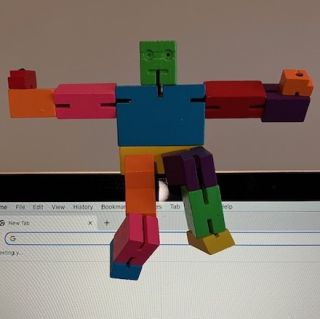Artificial Intelligence
I Am Not a Robot
Can we use AI without losing the power of our minds?
Posted March 24, 2023 Reviewed by Tyler Woods
Key points
- AI can collect and assimilate data faster than we can, but is it really more powerful than the human brain?
- Is AI an end product or a starting point in research and problem solving?
- This new software is fast, but is it creative? Does it really know all the answers?

Hello. It’s been several weeks since I last wrote to you. I needed the time to think about what I wanted to say.
You see, I am not a robot. Like you, I often must verify this fact by correctly counting the stoplights, trucks, or bicycles in various small boxes to identify if I am someone who counts and can reckon whether something is there or not. So far, I have always successfully passed this recognition test to prove that I am not, in fact, a robot and therefore can access information robots cannot.
What’s interesting about these little tests, other than they sometimes seem a bit foolish, is that they take time. Not much time, just a few seconds, but enough time, according to a recent New York Times column by Thomas L. Friedman (Everything, Everywhere Will Change All at Once, March 22, 2023), to dazzle us with GPT-4's power and speed. GPT-4 was able to first compose a press release in English, translate it into Arabic and Mandarin, then back to English in the form of a Shakespearean sonnet, all in just a few seconds.
Okay, I’m not a robot. I can’t do any of that. A good press release usually takes me a couple of hours of research, some time to pull all the information together into a coherent form, and another half hour or so to polish it so that it makes its point in as few words as possible. I also don’t speak, read, or write either Mandarin or Arabic, so translating any press release or anything else into those languages is outside my wheelhouse. As for reforming the press release as a Shakespearean sonnet: the last time I did something like that was in college, when I think it took me the better part of two days and I got an A- for effort and a few graceful lines.
While I’m musing about time, I would be remiss not to mention the time we all lost during the recent pandemic. More specifically, all the time we lost not sharing ideas with our colleagues at the office, time we lost away from our friends and families, and all the time we lost being isolated and unable to explore the world.
Time not exploring, sharing, and kicking around ideas over a good meal is a real loss: an honest-to-goodness loss of friendship and connection that we are now struggling to recover. It’s a slow process.
Time spent connecting, hanging out, and dreaming of “what if” is time robots have never experienced and do not rely on for discovery or decisions. Their intelligence and quick answers come from mega-databases that they can sort through in a nanosecond. They’re fast. Faster than we humans could ever be. But, in their vast fastness, are they missing something?
What have we missed in these last couple of years? What will we miss in the future if we give in to believing GPT-4 has all the answers we will ever need, and give up the chance to connect, argue, agree, explore, and discover new ideas in our own slow time?
Rather than connecting to the fast, vast world of GPT-4, is it time to slow down so we can be sure we get it right? Slow down so we can talk to each other, argue a little about what is the right answer, what is the best solution, what are the trade-offs, as well as where to find the best bagel in a nearby city.
I’m not opposed to the speed and snap of GPT-4’s synthesis of material any more than I’m opposed to a fast search on the internet for data that might get me thinking about why and what’s next. But I see neither of these robotic engines as the end-all product or sure-fire final answer to anything. I see both as starting points for further thinking and inquiry.
It would be a mistake to see either the internet or GPT-4 as the final product of any kind of research or thinking. There’s a certain satisfaction that comes from engaging in a project that pushes the limits of what we know, so why should we relinquish that satisfaction to a mega-database rather than enjoy exploring all the possibilities and solutions on our own?
That kind of exploration leads to questions we didn’t even know we needed to ask. Furthermore, if we don’t know the right questions to ask, we can’t use the real power of something like GPT-4 to get us started on finding a better solution.
GPT-4 is an amazing tool. But it’s a tool, not a substitute for using our brains and our basic ingenuity to find a better way to do or say almost anything.
Humans like to think. Our brains like to puzzle through problems, to find new solutions, new questions to ask.
That’s why we are not robots.




